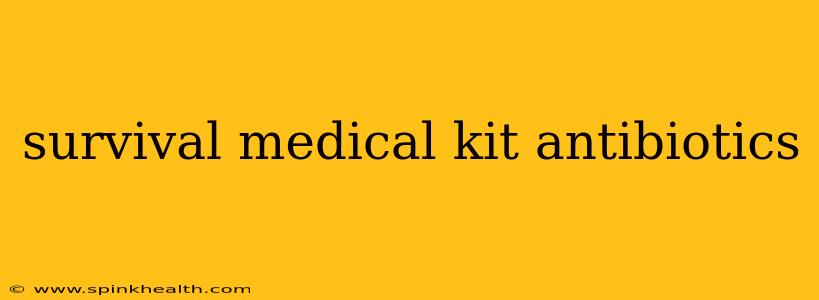The rustling of leaves, the crackle of a fire, the vast, untamed wilderness – these are the images that often come to mind when we think of survival. But true survival isn't just about finding shelter and food; it's about safeguarding your health. And in that fight for well-being, a well-stocked survival medical kit, including appropriate antibiotics, can be the difference between life and death. This isn't about playing doctor in the woods; it's about having the tools to manage minor infections and buy crucial time until professional medical help arrives. Let's delve into why antibiotics are vital components of a survival medical kit and how to approach this critical aspect responsibly.
Why are Antibiotics Important in a Survival Medical Kit?
Infections, even seemingly minor cuts and scrapes, can quickly become life-threatening in a wilderness setting where access to sterile environments and immediate medical care is limited. A simple infection can lead to sepsis, a potentially fatal condition characterized by the body's overwhelming response to infection. Antibiotics are designed to combat bacterial infections, giving your body a fighting chance against these dangerous threats.
What Type of Antibiotics Should I Include?
This is where caution is paramount. Self-treating with antibiotics can be extremely dangerous and lead to antibiotic resistance. You should never include antibiotics in your survival kit without first consulting a doctor or other qualified medical professional. They can assess your individual needs and risk factors, and advise on the appropriate type and dosage of antibiotics, if any, to include. Improper use can severely impact the effectiveness of antibiotics in the future.
How Should I Store Antibiotics in My Survival Kit?
Proper storage is critical to maintain the efficacy of your antibiotics. Check the packaging for specific storage instructions, but generally, keeping them in a cool, dry, and dark place away from direct sunlight is vital. Avoid storing them in areas with fluctuating temperatures, such as inside your vehicle.
What Other Medical Supplies Should I Include?
While antibiotics are essential, they are just one part of a comprehensive survival medical kit. Here are some other crucial items to consider:
- Wound care supplies: Antiseptic wipes, bandages of various sizes, gauze pads, medical tape, sterile dressings.
- Pain relievers: Ibuprofen or acetaminophen for pain and fever management.
- Anti-diarrheal medication: To address potential digestive issues from contaminated food or water.
- Antihistamines: For allergic reactions.
- Tweezers and scissors: For removing splinters or debris from wounds.
- First-aid manual: A detailed guide on treating common injuries and illnesses.
Are There Alternatives to Prescription Antibiotics?
While prescription antibiotics are the most effective option for bacterial infections, some natural remedies can be considered for minor skin infections. These include honey, tea tree oil, and aloe vera. However, these should only be used for minor infections and should not replace proper medical care or prescription antibiotics.
How Long Do Antibiotics Remain Effective?
The shelf life of antibiotics varies depending on the specific drug and storage conditions. Always check the expiration date on the packaging. Expired antibiotics may be less effective or even harmful.
How Do I Prepare for a Medical Emergency in the Wilderness?
Having a well-stocked survival medical kit is only part of the equation. Equally crucial is your knowledge and preparedness. Take a wilderness first aid course to learn proper wound care, how to recognize and treat various injuries and illnesses, and when to seek professional medical attention.
In conclusion, a survival medical kit is a testament to preparedness and a safeguard against unforeseen circumstances. While antibiotics play a critical role in combating infections, remember that responsible use, informed by medical advice, is key. Coupled with comprehensive first-aid knowledge and other essential supplies, your survival medical kit becomes your best ally in the face of unexpected challenges in the wild. Never underestimate the value of being prepared.

